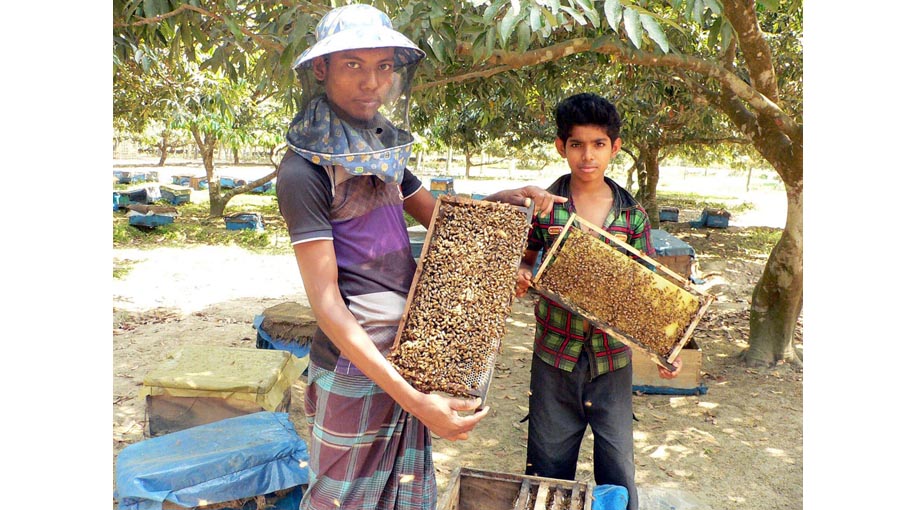71 anniversary of Mongla port celebrated


There is no forest or extensive mustard cultivation in Rangpur. That is why it was difficult to get pure honey in there even a few years ago. However, now the situation has changed.
Pure honey is being collected from wooden box-filled with bees that are planted inside litchi orchards in different areas including Badarganj of Dinajpur since last year.
Boxes of bees are being brought from the Sundarbans in Shyamnagar upazila of Satkhira district and they are being planted inside the litchi orchards of Dinajpur.
Now the swarm of bees is buzzing all day around the garden and filling the hives with honey. This in turn is meeting the demand of the country and being exported to India.
Moreover, with bees collecting honey from the litchi buds, the yield of litchi becomes good as well as the bees help with the pollination.
Last year, at least five litchi orchard owners in Badarganj took the initiative to collect honey from Mukul. Mouyals, including garden owners, have also been economically successful in this.
On the other hand, new possibilities are opening up among the local garden owners. As a result, many are preparing to collect honey this year as well.
According to bee-farmers and local Department of agriculture department, after collecting honey from mustard flowers, now honey is also being collected from litchi buds.
At the end of February, litchi buds appear on the trees. The buds remain on the tree for about a month from April to the time of fruiting. This causes the bees to pollinate the flowers.
The yield is also good from mustard, black cumin and coriander flowers along with litchi. Plenty of pure honey can also be collected from the buds of these crops.
After collecting this honey, it is being processed and marketed abroad. A group of bees are coming from Satkhira and collecting honey from those buds.
Read More: Rivers from Mongla Port to Rooppur to be dredged
Last year, wooden boxes of thousands of bees were planted in five litchi gardens on 100 hectares of land in Badarganj. The beehive is taken out of the box every three days. Later honey is collected from the wheel with the help of machine. The bees brought from the Sundarbans are replacing the extinct bees in the region.
Mouyal Ziaur Rahman Tuku of Jatindranagar area of Shyamnagar upazila of Satkhira said, “On the one hand we are benefiting because of the collection of honey from the buds. Similarly, the yield of the garden owner will be good.”
He said that per kg honey is sold in the wholesale market at a price of Tk 200 to 300.
Its price in the retail market has more than doubled. After collecting honey from beekeepers, various companies are processing the honey and exporting it abroad to meet the demand of the country.
Honey collector, locally known as Ziaur Rahman Tuku also said that it is possible to collect about 50 mounds of honey in a month from 129 bee boxes.
An organization called ‘AP’ collects honey from the beekeepers directly from the field. It is possible to collect honey from flowers and buds for at least six months of the year.
Mahfuz Wahid Choyan, an educated young man who owns a garden in Kumarpara, Badarganj, has planted litchi on about 10 bighas of land. However, there was not much yield in the garden.
“Yields have been good since he collected honey from litchi buds last year. In the language of agricultural science, the field where there will be bees will have at least 30 percent higher yield”, he added.
Choyan added that there were 370 bee boxes in the seven-acre litchi garden. From which about 15 mounds of honey can be collected every week. He said that the target has been set to collect about 60 mounds of honey from this garden this season.
According to the Badarganj Agriculture Department, collecting honey from buds is a lucrative business. Bees play a special role in pollination of flowers and buds.
The issue of collecting honey from litchi buds has not been in the minds of farmers of this region till now. But seeing the bee-farmers of Satkhira, many have become interested.




